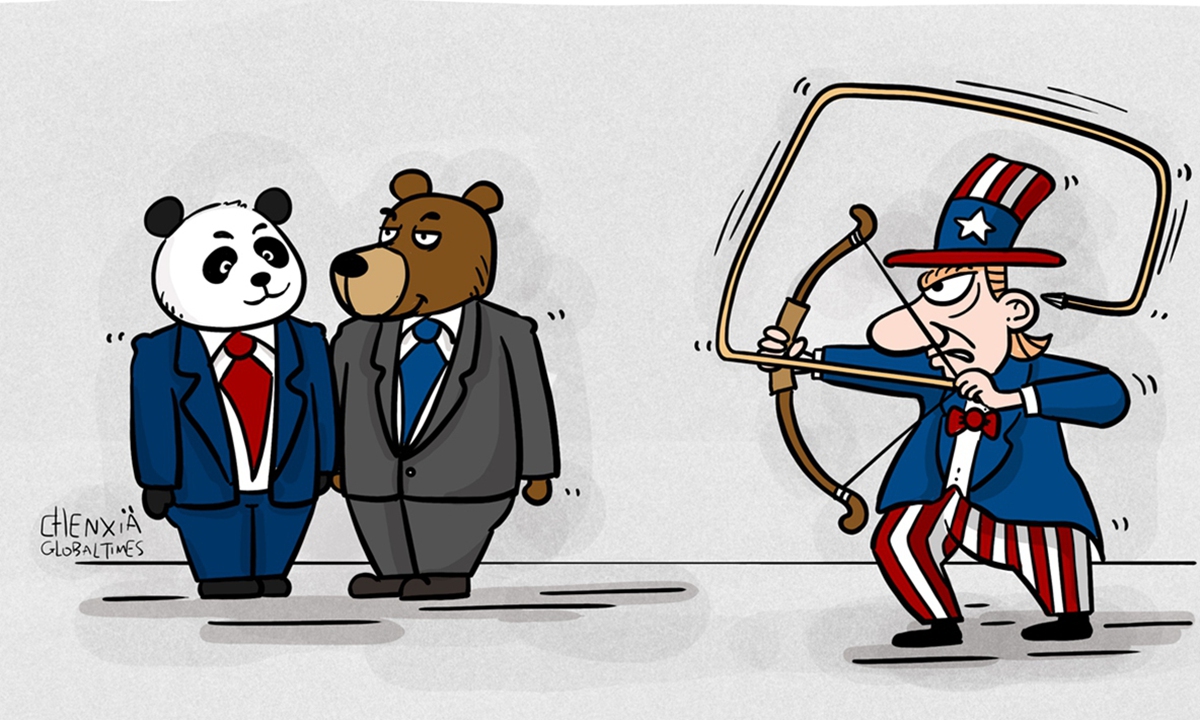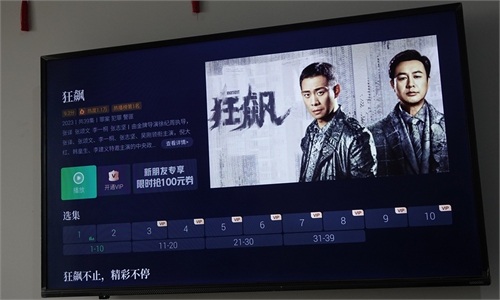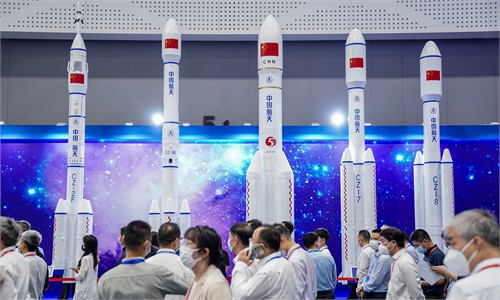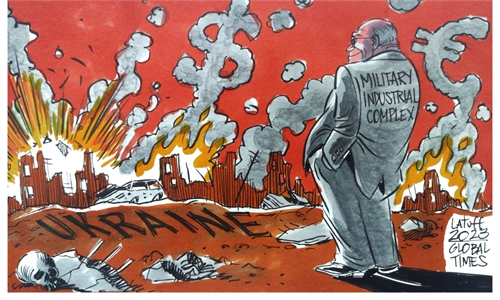
Illustration: Chen Xia/GT
Wang Yi, member of the Political Bureau of the Communist Party of China Central Committee and director of the Office of the Central Commission for Foreign Affairs, is paying a visit to Russia on Monday and Tuesday. Since the outbreak of the Ukraine crisis, both US media and politicians have increased their efforts in pushing sets of narrative against China-Russia relations.One is to try and drive a wedge between the two countries, portraying their bilateral relations as "expedient." The other is to hype the so-called "China-Russia axis" and call for a confrontation between the West and China and Russia, which seems to be more evidently days before Wang's visit.
"Hyping a so-called 'China-Russia alliance' and its confrontation with the Western camp in a sensational way, Washington is more aimed at its domestic audience and allies. The perceived threat of China and Russia is an inevitable excuse for Washington to increase military and defense spending. And it can also encourage European allies to move closer to the US," Cui Heng, an assistant research fellow from the Center for Russian Studies of East China Normal University, told the Global Times.
Noticeably, these two sets of rhetoric serve the same goal - that is to beef up the US' suppression of China and Russia.
The reasons why the US is concerned about China-Russia cooperation are multifaceted. At present, the most direct one is: The US worries that its plan to defeat Russia by using Ukraine as a proxy through large-scale assistance in the ongoing Russia-Ukraine conflict will fail.
As a matter of fact, the US' anxiety about China-Russia cooperation existed long before the Ukraine crisis. According to Cui, the US is fearful that if China and Russia join hands with more partners, such as those within Shanghai Cooperation Organization and BRICS, and establish a fairer world system, it will accelerate the collapse of the US-centered mechanism. This is the key why the US and the West are most worried about a close relationship between China and Russia.
Furthermore, US politicians, such as Secretary of State Antony Blinken, groundlessly hyped that China might supply weapons to Russia. This is a threat in disguise as well as a warning to China. Meanwhile, the US also wants to interfere with China's decision-making toward Russia. Some political elites in the US believe that China's policy toward Russia needs to take into account the feelings of Washington. In addition, the US is seeking to drag China into the Ukraine crisis created by the US in order to impair China's image and influence in the world.
This shows that Washington now has fewer policy instruments at hands, which is a symbol of the US' relative decline.
China has always underlined that China-Russia relations are not aimed at a third party. The development of China-Russia relations has nothing to do with the Russia-Ukraine conflict, nor is it aimed at jointly resisting the US. Instead, it is because bilateral cooperation can help the respective development of both sides. China can provide Russia with a huge market and technology, while Russia can guarantee China's security on energy and northern border.
US President Joe Biden is visiting Poland on Tuesday. Polish Prime Minister Mateusz Morawiecki said Sunday that Poland is in talks with the Biden administration about increasing the US troop presence in his country. Before the trip, he slipped into Kiev on Monday for the first time.
Answering a question after Wang delivered an address at the Munich Security Conference (MSC) on Saturday, he said that "Everything China has done is aimed at facilitating peace through dialogue. China will be firmly standing on the side of dialogue and peace." In comparison, while the US is adding fuel to the fire, China is actively promoting talks.
Cui noted that this reflects the two countries' different concepts of security. The US' security concept is a kind of exclusive Cold War mind-set - that is to defeat adversaries and squeezing their opponents' room, in a bid to achieve an absolute security.
China, on the other hand, has been promoting peace talks, advocating that security is not exclusive, but mutual. Wang said on the MSC that human society must not repeat the old path of antagonism, division and confrontation, and must not fall into the trap of zero-sum game, war and conflict. The West's practices on the Ukraine crisis is a continuation of Cold War camp confrontation mind-set, completely different from China's concept of security.
In the long run, the West's concept of security that is exclusive in nature is unlikely to work. Instead, it can only provoke resistance from major powers and lead to geopolitical conflicts. On the contrary, China's concept of security which puts emphasis on win-win result can truly solve security challenges. China's concept of security contributes far more to world peace than the US' kind.
The author is a reporter with the Global Times. opinion@globaltimes.com.cn



